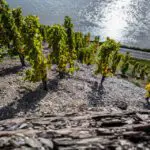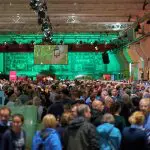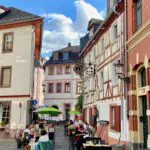Two decades ago, at a French-Italian wedding in the Jura region of Switzerland, the priest caught me by surprise when he recommended the newlyweds to always have a bottle of sparkling in the house. His message: a glass of wine keeps you communicating, and a good talk is the way to keep your marriage healthy. No further prompting did we need to apply this to our own matrimony. Since then Sekt-Fridays are reliably working their magic.
In a wider context a joint glass of wine amongst world leaders would do no harm either. I figure Angela Merkel and other head of states taking turns in hosting a regular’s table, chewing the fat over a glass of wine, with neckties relaxed, high-heels kicked off. Possibly tariff disputes could be solved between top-ups and belligerent ambitions could be tackled in a sabrage competition.
Which wines would they have? In Germany surely Riesling, right? We find plenty of pointers in a book published 2018 ‘Mit Weinen Staat machen‘ (roughly: ‘doing politics with wines’) by Knut Bergmann – a most delectable account of German wine history and state politics.
We learn that at the turn of 19th century the Reich’s Chancellor Bismarck was a fan of Pfalz Rieslings, especially from the vineyard called Ungeheuer. The epicurean statesman was officially a big supporter of the Kupferberg Sekt in Mainz (where he resided for a while) yet privately he preferred Champagne. We learn that teetotaler Hitler handed out sweet Rieslings from the Monastery Eberbach’s Steinberg to foreign diplomats. Post WW 2, the Federal Republic’s first Chancellor (and real oenophile) Konrad Adenauer had a penchant for the same vineyard. And he was a big aficionado of sweet wines. Allegedly Adenauer personally arranged for icewine to be poured at a state banquet in the French Élysée Palace. It is said that the reaction of the far less oenophile French Président De Gaulle were not to the chancellor’s expectations.
There are many more juicy anecdotes in Bergmann’s book, reaching up to more recent state receptions, with details about wines, vintages, vintners, prime ministers and presidents who got treated to teutonic hospitality. With regards to what’s being poured, according to the chapter called ‘Statistics’, Riesling leads for white wines, and Spätburgunder for the reds. No surprise here.
Boomeranging back to the original question… Bergmann offers indications as to which estates are being poured at Merkels functions: wines from excellent estates of the likes of Bernhard Huber (Baden), Dreissigacker (Rheinhessen), Stigler (Baden), Schloss Proschwitz (Saxen) – a more extensive list of German wines that made it through the gullets of the powerful is featured below.
Privately choices may be a little different though: during Covid19 lockdown this March Merkel got spotted doing her groceries, in the trolley two bottles of what the tabloids thought to be affordable white Burgundy…. Now I can’t help fantasising: Would wine lover Président Émmanuel Macron be pleased to get poured inexpensive Chardonnay? Would Trump bring a ‘Trump Blanc de Blanc’…? And Boris Johnson… some Hungarian wines perhaps ? What’s Biden’s favorite tipple? And Putin… what about Putin…?
Time to pop open a bottle of Riesling and discuss all of that with my wife.
++++
Sources
Bergmanns book is worth every dime – however there’s no translation available as of yet. If you read German, get it at Amazon.
A similar publication on wines at the White House just got published: “Wine and the White House: A History” by Frederick J. Ryan. Unfortunately the book isn’t available in Europe (would you mail me a copy?).
Examples of German wines for presidents…
Domänenweingut Schloss Schönborn (Rheingau): Pfaffenberg Riesling Spätlese 1979 for the president of Brasil
Fürstlich Castellsches Domänenamt (Franken) a Casteller Kugelspiel Kerner Kabinett Trocken 1986 (no Sylvaner!?) for Michael Gorbachev in 1989
Hessische Staatsweingüter Kloster Eberbach (Rheingau) – Rauenthaler Wülfen Auslese 1953 for French Président Charles de Gaulle in 1963; Steinberger Riesling Kabinett 1969 for Swedens King Gustav Adolf in 1972
Maximin Grünhäuser (Mosel) – Abtsberg Riesling Trocken 1990 for French Président Mitterand in 1991; and Herrenberg Riesling 1964 for the Shah of Persia in 1967
Schloss Johannisberg (Rheingau) – Riesling Grünlack 1964 also for the Shah of Persia in 1967
Joh. Jos. Prüm (Mosel) – Scharzhofberger Riesling Kabinett 1989 for Nigerian President Babangida in 1992
Schloss Reinhartshausen (Rheingau) – Erbacher Siegelberg Edelbeerenauslese 1953 for the President of Costa Rica Figueres in 1956 and Hattenheimer Willborn Riesling Cabinet 1961 for Queen Elizabeth in 1965
Bürklin-Wolf (Pfalz) – Forster Pechstein Riesling Spätlese 1985 for French Président Mitterand in 1989
Schlossgut Diel (Nahe) – Sekt Brut 1992 for Finnish President Ahtisaari in 1994
Rudolf Fürst (Franken) – Bürgstadter Centgrafenberg Spätburgunder 1992 for Finnish President Ahtisaari in 1994
Knipser (Pfalz) – CuvéeX 2003 for the European head of states in 2007; and Laumersheimer Kirschgarten Dornfelder Spätlese 1993 for Nelson Mandela in 1996
Sektkellerei Bardong (Rheingau) – Geisenheimer Schlossgarten Riesling Brut 1990 for Queen Elizabeth in 1992








